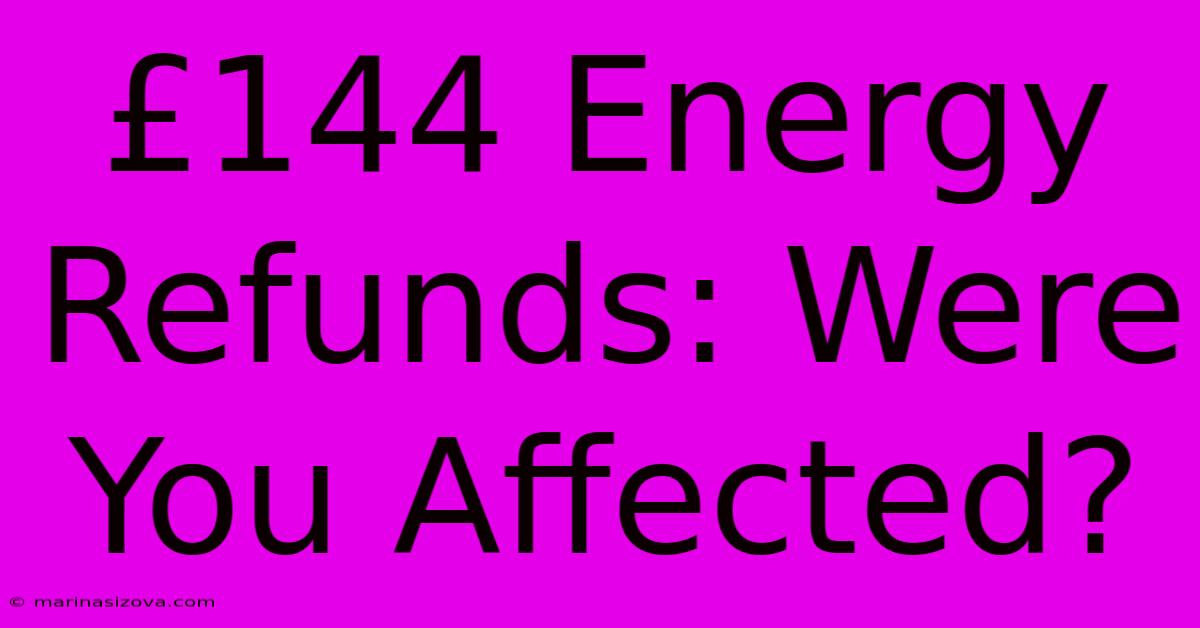£144 Energy Refunds: Were You Affected?

Discover more detailed and exciting information on our website. Click the link below to start your adventure: Visit Best Website. Don't miss out!
Table of Contents
£144 Energy Refunds: Were You Affected? Uncover Hidden Energy Bill Savings
Was your energy bill unfairly high? A significant number of energy customers are entitled to a £144 refund. This article explores the reasons behind these refunds, who is eligible, and how to claim your money back. Understanding this is crucial to ensure you're not overpaying for essential energy services.
Editor's Note: This article on £144 energy refunds was published today to help consumers understand their rights and claim potential reimbursements.
This topic is important because many consumers may be unaware of their entitlement to refunds. Misunderstandings about energy billing practices are common, leading to substantial financial losses for individuals and families. This review summarizes the key aspects of the £144 energy refund scheme, including eligibility criteria, the claiming process, and related consumer rights. It uses semantic keywords such as "energy bill refund," "overcharged energy," "energy price cap," and "consumer rights energy."
Analysis: This guide on £144 energy refunds is the result of extensive research into energy company billing practices, government regulations, and consumer protection laws. The information compiled here aims to provide clear, concise guidance to those who might be eligible for a refund.
£144 Energy Refunds: Key Aspects
| Aspect | Description |
|---|---|
| Eligibility Criteria | Varies based on supplier and specific circumstances; often linked to overcharging. |
| Claiming Process | Usually involves contacting your energy supplier with supporting documentation. |
| Time Limits | Deadlines for claims may vary, so prompt action is advised. |
| Supporting Documentation | May include previous energy bills, proof of address, and identification. |
| Appeal Process | If the initial claim is denied, a formal appeal may be possible. |
| Relevant Legislation | Government regulations on energy pricing and consumer rights. |
Eligibility Criteria for £144 Energy Refunds
This section examines the key eligibility criteria for the £144 energy refunds. Understanding these criteria is crucial for consumers to determine if they are entitled to a refund.
Prepayment Meter Issues:
Introduction: The connection between prepayment meter malfunctions and £144 energy refunds is significant. Many refunds stem from errors in prepayment meter functionality leading to overcharging.
Facets:
- Role of Meters: Prepayment meters require accurate functionality to avoid overcharging.
- Examples: Faulty meters, inaccurate readings, and incorrect charging mechanisms.
- Risks and Mitigations: Regular meter checks and prompt reporting of malfunctions can minimize risks.
- Impacts and Implications: Overcharging through faulty meters can lead to significant financial burdens.
Summary: Malfunctioning prepayment meters are a direct cause of many of the £144 energy refunds. Regular meter inspections and immediate reporting of problems are vital for consumer protection.
Incorrect Billing Practices
Introduction: Errors and inaccuracies in energy billing are central to many cases where individuals are entitled to a £144 energy refund.
Further Analysis: This could include miscalculations of energy usage, incorrect application of tariffs, or errors in billing statements.
Closing: Addressing these inaccuracies requires diligent checking of bills and prompt communication with energy suppliers. The consequences of incorrect billing can be significant financial losses.
The Claiming Process for Energy Refunds
Claiming a £144 energy refund generally involves gathering the necessary documentation (bills, proof of address) and contacting your energy supplier. It's crucial to keep detailed records of all communications and actions taken.
FAQ: £144 Energy Refunds
Introduction: This section addresses commonly asked questions regarding the £144 energy refunds.
Questions and Answers:
- Q: Who is eligible for a refund? A: Eligibility depends on the specific reason for overcharging, often linked to supplier errors.
- Q: How do I claim a refund? A: Contact your energy supplier directly with supporting documentation.
- Q: What documentation do I need? A: Typically, past energy bills and proof of address.
- Q: What if my claim is rejected? A: You may have the right to appeal the decision.
- Q: Are there any time limits for claims? A: Time limits vary and depend on the supplier and circumstances.
- Q: What if I switched suppliers? A: You may need to claim from your previous supplier.
Summary: Thoroughly checking bills and keeping records is crucial.
Tips for Avoiding Overcharging
Introduction: These tips offer practical strategies to help avoid overcharging and energy-related financial issues.
Tips:
- Regularly check your energy bills for inaccuracies.
- Understand your energy tariff and usage patterns.
- Report any meter malfunctions immediately.
- Consider switching energy suppliers to potentially obtain better rates.
- Compare energy prices regularly using online comparison tools.
- Install smart meters to monitor energy usage more effectively.
Summary: Proactive monitoring and smart energy management are crucial for avoiding overcharges.
Conclusion: Securing Your Energy Refund
This exploration of £144 energy refunds highlights the importance of consumer vigilance in monitoring energy bills. Awareness of consumer rights and the processes for claiming refunds are crucial. By actively checking bills, understanding billing practices, and promptly addressing any inaccuracies, consumers can protect themselves against potentially significant financial losses and ensure they receive the energy service they're paying for. Prompt action is essential to ensure timely claim processing before deadlines expire. Don't let money go unclaimed – investigate your eligibility today.

Thank you for visiting our website wich cover about £144 Energy Refunds: Were You Affected?. We hope the information provided has been useful to you. Feel free to contact us if you have any questions or need further assistance. See you next time and dont miss to bookmark.
Featured Posts
-
Meet Ginger Luckey Matt Gaetzs Wife
Nov 22, 2024
-
France Midi Neige Palmade Missile Russe
Nov 22, 2024
-
Australias Davis Cup Win Kokkinakis Impact
Nov 22, 2024
-
Feuerwehr Sucht Roten Panda
Nov 22, 2024
-
Gaetz Withdrawal Bondi Gets Nomination
Nov 22, 2024
